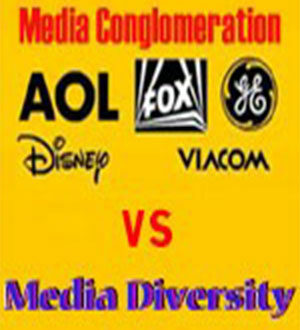Media Concentration & Democracy in the Marketplace of Ideas
Five companies – Viacom (owner of CBS), Disney (ABC), News Corporation (Fox), General Electric (NBC) and AOL Time Warner – control about 75 percent share of production of prime-time viewing. Research conducted by the Project for Excellence in Journalism finds that larger companies and network owned TV stations produce lower quality news shows than do smaller media companies. These five corporations are now on the verge of controlling the same number of television households as the big three broadcast networks did forty years ago. In the past, when three or four broadcast networks controlled so many households, the Commission protected the public’s interest in competition and diversity of viewpoints by requiring independent production of programming.
No such policy protects the American public today. Tom Wolzien, a Wall Street analyst terms this “programming oligopoly” and shows that it exists both in the distribution and production of programming. For example, NBC owns outright or holds a significant financial interest in one hundred percent of the new series on its schedule. The other networks are not far behind. Rather than compete fairly in the marketplace of ideas, the networks leveraged their control of the publicly owned airwaves to take over television program production, driving small businesses and creative entrepreneurs, many of whom were women and minorities, out of business.
The biased coverage of the war against Iraq by the mainstream media, particularly by Fox, demonstrates the pitfalls of media concentration. Interestingly, Michael Powell makes the connection between the war and his agenda. He says that bigger media companies are needed more than ever because only they can cover the war the way the Iraq war was covered.
The Big Five
* Viacom – 2002 revenues $24.6 billion. Owns 39 broadcast television stations and 185 radio stations. Cable networks include MTV, Nickelodeon and BET. Other businesses include CBS, UPN, Paramount Pictures, Simon & Schuster and an 80.4 percent equity interest in Blockbuster Video.
* News Corporation – 2002 total revenues $17 billion. Owns (80.6 percent) the Fox Entertainment Group, which includes 20th Century Fox, Fox Television Stations, and Fox Cable (includes sports and movie channels, National Geographic Channel). Fox Television owns 60 television stations and has 188 affiliates. News Corporation is the world’s largest publisher of English-language newspapers, including the New York Post. Also owns HarperCollins Publishers.
* AOL Time Warner – 2002 revenues $40.9 billion. Businesses owned include America Online, CNN, Time Warner Cable, Warner Bros. Pictures, Turner Networks (includes TBS Superstation) and HBO. The Warner Music Group’s major record labels include Elektra and Atlantic. The publishing business conducted primarily through Time Inc. includes Time, People, Sports Illustrated, Fortune and Money. The Securities and Exchange Commission and the Department of Justice are conducting investigations into accounting and disclosure practices of the company.
* General Electric – 2002 revenues $31.7 billion. NBC provides network television services to more than 220 affiliated stations, produces television programs, operates 28 television-broadcasting stations, operates four cable/satellite networks around the world, and has investment and programming activities in the Internet, multimedia and cable television. Also owns Telemundo, one of the two largest hispanic broadcasting networks.
* Walt Disney – 2002 total revenues $25.3 billion. Operates the ABC Television Network, which has 226 primary affiliated stations. ABC Radio Networks provide programming to more than 4,600 affiliated radio stations. Radio Disney is carried on 51 stations, including 32 that are owned by the company. ABC Radio Networks also produce the ESPN Radio format, which is carried on more than 700 stations, including 215 full-time (four of which are owned by the company), making it the largest radio sports network in the United States. Disney also owns 10 television stations, 44 standard AM radio stations, and 18 FM radio stations.
Conclusion
As Virginia Riskin, President of the Writer’s Guild of America, said in her remarks at one of the FCC hearings on the proposed rule changes in February, “The media are the modern-day American Town Square, the place where people from different backgrounds and points of view share their stories and the public learns about the world.” Ensuring broadest participation at this modern American town square is an essential precondition for a pluralistic democracy to flourish. The First Amendment rests on the assumption that the widest possible dissemination of information from diverse and antagonistic sources is essential to the welfare of the public. As the Supreme Court has reiterated, “Assuring that the public has access to a multiplicity of information sources is a governmental purpose of the highest order, for it promotes values central to the First Amendment.”

Media Diversity at Risk
Pages: 1 2
 Mouood Mouood English Edition
Mouood Mouood English Edition



